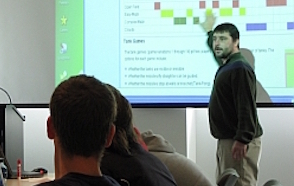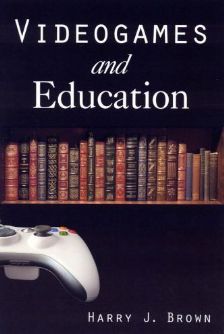At the Forefront of Digital Humanities

January 5, 2016
Harry J. Brown, Tenzer Family University Professor in Instructional Technology, associate professor of English and chair of the English Department, finds himself at the forefront of Digital Humanities teaching at DePauw.
The combination of the humanities and digital resources and methodology is a growing trend in universities and research around the world. Some fear that using approaches such as macroanalysis, stylometry and visualization takes away from the fundamental skills of interpretation associated with the humanities. However, Professor Brown believes that these resources do not replace those traditional skills, but rather supplement and expand the horizon of what is possible in the Humanities.
Among the advantages of using digital tools are the time savings and new opportunities for interpretation and research that they open. Instead of paging through entire volumes of an author’s work to look for reoccurring themes and words, scholars can plug those volumes into programs that look for those patterns with more accuracy and in exponentially less time. With these tools, scholars spend less time counting and more time doing more targeted research and interpretation.
Professor Brown has used these tools in many of his classes, including English 161, 251, a first-year seminar, an Honor Scholar Seminar and a Winter Term course. Students learn how to use these tools and where to employ them, such as in data mining and visualization of timelines.
 Professor Brown is author of Videogames and Education: Humanistic Approaches to an Emergent Art Form, and he is interested in game-based pedagogies that involve the students in interactive projects. He also thinks that in the not-so-distant future it will become redundant to say Digital Humanities, because digital tools and projects will be integrated fully into our understanding of the field.
Professor Brown is author of Videogames and Education: Humanistic Approaches to an Emergent Art Form, and he is interested in game-based pedagogies that involve the students in interactive projects. He also thinks that in the not-so-distant future it will become redundant to say Digital Humanities, because digital tools and projects will be integrated fully into our understanding of the field.
Accessibility is a unique aspect of using a digital medium, because it ensures that humanities projects will have a larger audience and involve greater collaboration. Professor Brown also conducted a research project with a few students about grave stone poetry, and he admits that it was dependent on online collections of gravestone photography from around the country. In this way, the Digital Humanities ensures that research in one area of the world can be accessed and built on in the future.
Back